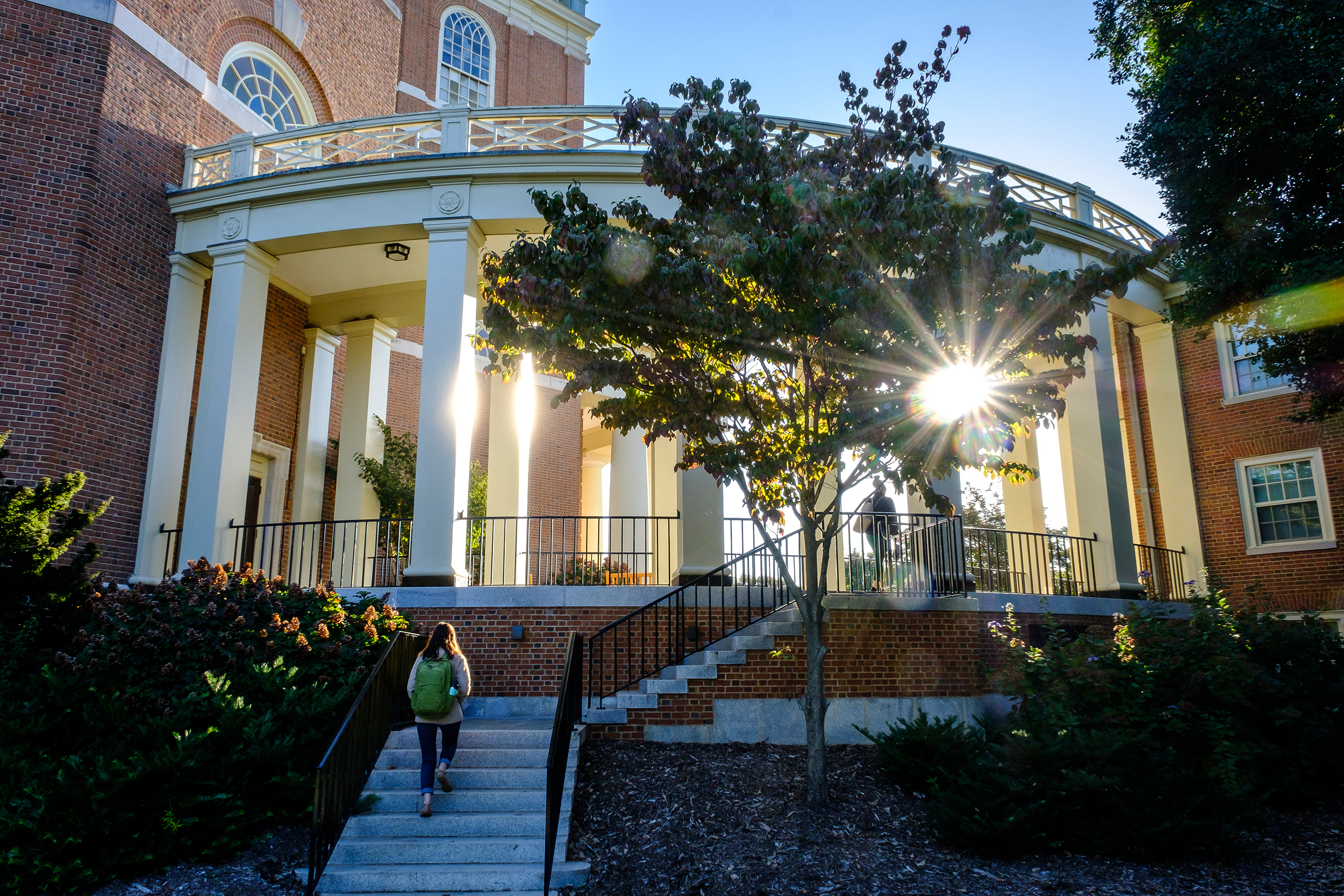Teaching with technology
Anyone who has taken an introductory college science course knows the textbooks are typically dense, text-heavy and expensive.
An interactive replacement for the traditional college-level biology textbook called BioBook™, which was developed by an interdisciplinary team of Wake Forest faculty, allows students and instructors to tailor traditional course materials to their own learning styles.
But switching from rigid, linear textbooks to technology such as iPads alone won’t boost student performance, says Assistant Professor of Education Kristin Redington Bennett, whose expertise in the learning sciences has shaped BioBook’s evolving design, structure and evaluation. She explains why embracing technology in teaching is so important and how BioBook presents a promising solution to a problem facing students and teachers across America.
How has technology changed the way people learn?
Today’s learners are immersed in technology both in and out of the classroom. Students now think and learn differently from previous generations. The differences stem from their immersion in digital technology. By the time they’re in their 20s, the digital natives will have spent more than 30,000 hours on the Internet and playing video games. This is happening at a time when their brains are particularly sensitive to outside influences, and it has changed their mental reflexes and habits, the way they learn and absorb information.
Therefore, the process of learning in the classroom has become significantly richer as students have access to new and different types of information that they can access, view, evaluate, manipulate, and interact with. Further, technology has allowed students to communicate in a variety of media and collaborate with peers from the classroom next door or a continent away.
How has your research played a role in BioBook’s design and development?

Biology Senior Lecturer Dan Johnson demonstrates the utility of an iPad as an interactive textbook to student Rebecca Perry.
Typically, biology textbooks are written by biologists. Rarely are researchers in education consulted to inform the design of a textbook. Fortunately, Dan Johnson, our project’s principle investigator and a Senior Lecturer in Biology, is keenly aware of the learning sciences and the importance of applying their principles in instructional design.
My research has been focused on instructional design including formative assessment supported by mobile technology, and one of the courses I teach each semester is “Learning and Cognitive Science.” Thus, my research contributed heavily to the overall design (interactive, non-linear), the tools (assessment for learning, content connections, collaboration), and the structure of the content (chunking, multi-modal) of BioBook. Further, being in the social sciences, I have contributed to the team with my experience in survey design, evaluation of self-efficacy and persistence, and professional development of the instructors who are using BioBook.
How does BioBook differ from an e-Textbook, and why are those differences important?
Several features of BioBook distinguish it from both traditional textbooks and textbooks that have just been reproduced for digital access.
Textbooks are traditionally designed as linear purveyors of content with little attention paid to how people actually learn. By contrast, BioBook’s design relies on principles of cognitive science that suggest that to engage in deep learning students must actively engage in the information; connect new content to prior knowledge; receive frequent, informal feedback; be conscious of their own learning processes; and be provided with opportunities to work and learn collaboratively.
BioBook was created as an interactive e-text that relies on a simple, yet powerful node structure that both organizes content knowledge and provides a scaffold for assisting novice learners. Using a metaphorical node structure based on a tree – with roots, branches and leaves for increasingly detailed chunks of information – students follow different paths as they explore and interact with new knowledge. Students can approach topics in the way that makes sense to them, rather than the order dictated by textbook authors.
BioBook also teaches students how to learn using a pattern of study-test-study-test that can produce greater learning gains in nearly any topic area. The software requires that students work at a higher level of thinking and become more metacognitively aware of their knowledge deficits. However, unlike traditional texts, this interactive textbook design allows students to collaborate with their instructors and others in the course.
Finally, the analytics available through the software platform allow instructors to view student results on the formative assessments, allowing them to note and target students’ problem areas and misconceptions so they can focus lecture time on creating accurate content understanding.
How will you evaluate its success in the classroom this semester and beyond?
First to define what we identify as success – BioBook aims to create deeper student learning and engagement, with the goal of improving persistence and success in general biology — a barrier to graduation for many students. Another barrier for success is lack of access to quality, affordable textbooks. Final costs for BioBook have not been determined, though we expect they will be equivalent to or less than current e-texts of similar size. Success then will also include being able to eliminate or reduce cost barriers to textbook purchase.
To help us determine the effectiveness of BioBook, Odigia, our educational technology partner, has created a platform that allows us to collect analytics on persistence, or time spent on each page; understanding, using assessment data; and the ability to relate these reports to demographic data including identifiers for at-risk students. In addition to these results, we will have self-reported data from both students and instructors as well as focus groups from these users.
What is your hope for the future of BioBook?
Although most biology non-majors don’t read (or even buy) their science texts, our field tests show that BioBook engages students in a way that textbooks never have. Our initial feedback gives us hope that we have created a tool that will lead to fewer non-majors dropping out of biology, which is a required course for graduation. This feedback also shows promise that our root-branch-leaf structure could succeed in other academic disciplines. We hope to have created a content agnostic framework that functions beyond a replacement for textbooks and toward a blended platform for improving learning and teaching.
Categories: Research & Discovery, University Announcements
Media Contact
Wake Forest News
media@wfu.edu
336.758.5237



